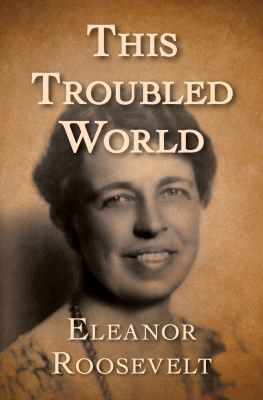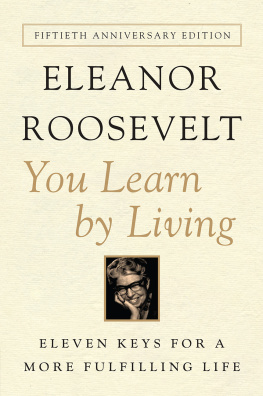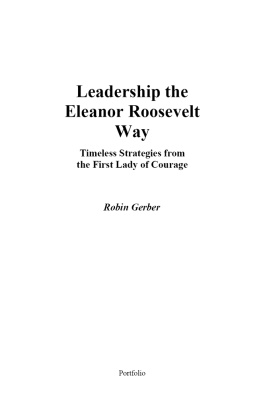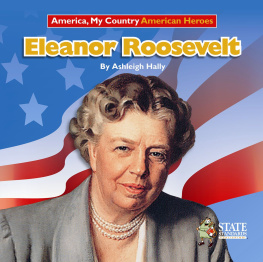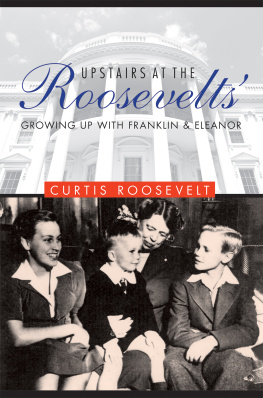This Troubled World
Eleanor Roosevelt
To
MRS. CARRIE CHAPMAN CATT
who has led so many of us
in the struggle for peace
The Case as it Stands
THE newspapers these days are becoming more and more painful. I was reading my morning papers on the train not so long ago, and looked up with a feeling of desperation. Up and down the car people were reading, yet no one seemed excited.
To me the whole situation seems intolerable. We face today a world filled with suspicion and hatred. We look at Europe and see a civil war going on, with other nations participating not only as individual volunteers, but obviously with the help and approval of their governments. We look at the Far East and see two nations, technically not at war, killing each other in great numbers.
Every nation is watching the others on its borders, analyzing its own needs and striving to attain its ends with little consideration for the needs of its neighbors. Few people are sitting down dispassionately to go over the whole situation in an attempt to determine what present conditions are, or how they should be met.
We know, for instance, that certain nations today need to expand because their populations have increased. Certain people will tell you that the solution of this whole question lies in the acceptance or rejection of birth control. That may be the solution for the future, but we can do nothing in that way about the populations that now exist. They are on this earth, and modern science has left us only a few places where famine or flood or disease can wipe out large numbers of superfluous people in one fell swoop. For this reason certain nations need additional territory to which part of their present populations may be moved; other nations need more land on which to grow necessary raw materials; or perhaps they may need mineral deposits which are not to be found in their own country. You will say that these can be had by trade. Yes, but the nations possessing them will frequently make the cost too high to the nations which need them.
It is not a question today of the free interchange of goods. If standards of living were approximately the same, throughout the world, competition would be on an equal basis and then there might be no need for tariffs. However, standards of living vary. The nations with higher standards have set up protective barriers which served them well when they were self-contained, but not so well when they reached a point where they either wished to import or export.
When you take all these things into consideration, the size of this problem is apt to make you feel that even an attempt to solve it in the future by education is futile. Faint heart, however, neer won fair lady, nor did it ever solve world problems!
Peace plan after peace plan has been presented to me; most of them, I find, are impractical, or not very carefully thought out. In nearly all of them some one can find a flaw. I have come to look at them now without the slightest hope of finding one full-fledged plan, but I keep on looking in the hope of finding here and there some small suggestion that may be acceptable to enough people to insure an honest effort being made to study it and evaluate its possible benefits.
For instance, one lady of my acquaintance brought me a plan this past spring which sounded extremely plausible. Her premises are: We never again wish to send our men overseas; we wish to have adequate defense; we do not need a navy if we do not intend to go beyond our own shores; submarines and airplanes can defend our shores, with guns along our coasts as an added protection. Therefore, we do not need an army, for our men are going to stay at home. With our coast defenses strong, nobody will land here, so why go to the expense of an army? We do not need battleships or, in fact, any navy beyond submarines because we do not intend to own any outlying possessions.
In this way, said the lady, we will save vast sums of money which can be applied to all the social needs of the daybetter housing, better schools, old age pensions, workmens compensation, care of the blind and crippled and other dependents. There is no limit to what we might do with this money which we now spend on preparation for destruction.
It is a very attractive picture and I wish it were all as simple as that, but it seems to be fairly well proved that guns along our coasts are practically useless. No one, as far as I know, has ever devised an adequate defense by submarines and airplanes, or calculated whether the cost of the development of these two forces would really be any less than what we spend at present on our army and navy.
The greatest defense value of the navy is that its cruising radius is great enough to allow it to contact an attacking force long before that force reaches our shores. If we trusted solely to submarines and airplanes we would have to have them in sufficient number really to cover all our borders, and this type of defense would seem to be almost prohibitive in cost for a nation with a great many miles of border to defend.
Has any one sounded out the people of this country as to their willingness to wait until an attacking enemy comes within the cruising radius of our planes and submarines? Have we faced the fact that this would mean allowing an attacking enemy to come unmolested fairly near to our shores and would make it entirely possible for them to land in a nearby country which might be friendly to them, without any interference on our part? Have our citizens been asked if they are willing to take the risk of doing without trained men? We have always had a small trained army forming the first line of defense in case somebody does land on our borders, or attempts to approach us by land through a neighboring country. Our army has not been thought of as an attacking force; do we want to do away with it?
Are all the people in this country willing also to give up the outlying islands which have come into our possession? Some of them cost us more than they bring in, but others bring certain of our citizens a fair revenue. Can we count on those citizens to accept the loss of these revenues in the interests of future peace?
Perhaps this is part of what we will have to make up our minds to pay some day as the price of peace; but has any one as yet put it in concrete form to the American people and asked their opinion about it?
One of the things that is most frequently harped upon is the vast sums of money spent for war preparation in this country. Very frequently the statements are somewhat misleading. It is true that in the past few years we have spent more than we have for a number of preceding years because we had fallen behind in our treaty strength but, in a world which is arming all around us, it is necessary to keep a certain parity and these expenditures should be analyzed with a little more care than is usual.






